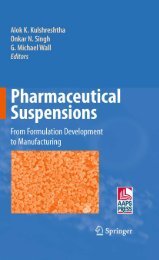- Page 2:
Current Cancer Research For other t
- Page 8:
Editor Marcelo G. Kazanietz, Ph.D.
- Page 14:
Contents Part I Regulation of PKC I
- Page 18:
Contents 21 PKC and Resistance to C
- Page 24:
xii Contributors Maria T. Diaz-Meco
- Page 28:
xiv Contributors Lauren Van Wassenh
- Page 32:
Chapter 1 Protein Kinase C in Cance
- Page 36:
1 Protein Kinase C in Cancer Signal
- Page 40:
1 Protein Kinase C in Cancer Signal
- Page 44:
Chapter 2 Regulation of Conventiona
- Page 48:
2 Regulation of Conventional and No
- Page 52:
2 Regulation of Conventional and No
- Page 56:
2 Regulation of Conventional and No
- Page 60:
2 Regulation of Conventional and No
- Page 64:
2 Regulation of Conventional and No
- Page 68:
2 Regulation of Conventional and No
- Page 72:
2 Regulation of Conventional and No
- Page 76:
26 P.M. Blumberg et al. 3.1 Introdu
- Page 80:
28 P.M. Blumberg et al. 1981; Diamo
- Page 84:
30 P.M. Blumberg et al. 3.4 DAG-Lac
- Page 88:
32 P.M. Blumberg et al. 3.6 Role of
- Page 92:
34 P.M. Blumberg et al. Interesting
- Page 96:
36 P.M. Blumberg et al. the proximi
- Page 100:
38 P.M. Blumberg et al. 3.14 C1 Dom
- Page 104:
40 P.M. Blumberg et al. the A and B
- Page 108:
42 P.M. Blumberg et al. The above r
- Page 112:
44 P.M. Blumberg et al. 3.19 Role o
- Page 116:
46 P.M. Blumberg et al. 3.20 Conclu
- Page 120:
48 P.M. Blumberg et al. Churchill,
- Page 124:
50 P.M. Blumberg et al. the isoster
- Page 128:
52 P.M. Blumberg et al. Pu, Y., Pea
- Page 132:
Chapter 4 Diacylglycerol Signaling:
- Page 136:
4 Diacylglycerol Signaling OH O P D
- Page 140:
4 Diacylglycerol Signaling intermed
- Page 144:
4 Diacylglycerol Signaling cPKC (α
- Page 148:
4 Diacylglycerol Signaling 4.3 DAG
- Page 152:
4 Diacylglycerol Signaling DGKα DG
- Page 156:
4 Diacylglycerol Signaling the spat
- Page 160:
4 Diacylglycerol Signaling adhesion
- Page 164:
4 Diacylglycerol Signaling prolifer
- Page 168:
4 Diacylglycerol Signaling Gomez-Me
- Page 172:
4 Diacylglycerol Signaling Maruyama
- Page 176:
4 Diacylglycerol Signaling Cepsilon
- Page 180:
Chapter 5 Regulation of PKC by Prot
- Page 184:
5 Regulation of PKC by Protein-Prot
- Page 188:
5 Regulation of PKC by Protein-Prot
- Page 192:
5 Regulation of PKC by Protein-Prot
- Page 196:
5 Regulation of PKC by Protein-Prot
- Page 200:
5 Regulation of PKC by Protein-Prot
- Page 204:
5 Regulation of PKC by Protein-Prot
- Page 208:
5 Regulation of PKC by Protein-Prot
- Page 212:
5 Regulation of PKC by Protein-Prot
- Page 216:
5 Regulation of PKC by Protein-Prot
- Page 220:
5 Regulation of PKC by Protein-Prot
- Page 224:
5 Regulation of PKC by Protein-Prot
- Page 228:
5 Regulation of PKC by Protein-Prot
- Page 232:
Chapter 6 Introduction: PKC Isozyme
- Page 236:
6 Introduction: PKC Isozymes in the
- Page 240:
6 Introduction: PKC Isozymes in the
- Page 244:
6 Introduction: PKC Isozymes in the
- Page 248:
6 Introduction: PKC Isozymes in the
- Page 252:
118 E. Rozengurt Keywords Protein k
- Page 256:
120 E. Rozengurt The initial descri
- Page 260:
122 E. Rozengurt mechanisms, involv
- Page 264:
124 E. Rozengurt PKC DAG DAG P Ser
- Page 268:
126 E. Rozengurt Each translocation
- Page 272:
128 E. Rozengurt multisite phosphor
- Page 276:
130 E. Rozengurt Table 7.1. Identif
- Page 280:
132 E. Rozengurt gastrointestinal p
- Page 284:
134 E. Rozengurt receptor for bacte
- Page 288:
136 E. Rozengurt (Zhang et al. 2005
- Page 292:
138 E. Rozengurt PKD-mediated phosp
- Page 296:
140 E. Rozengurt Clearly, more expe
- Page 300:
142 E. Rozengurt In conclusion, stu
- Page 304:
144 E. Rozengurt Doppler, H., Storz
- Page 308:
146 E. Rozengurt Johannes, F. J., P
- Page 312:
148 E. Rozengurt Mellor, H., & Park
- Page 316:
150 E. Rozengurt Rey, O., Yuan, J.,
- Page 320:
152 E. Rozengurt Van Lint, J. V., S
- Page 324:
154 E. Rozengurt Zugaza, J. L., Sin
- Page 328:
156 J.D. Black Keywords PKC • Cel
- Page 332:
158 J.D. Black A and B (Malumbres a
- Page 336:
160 J.D. Black epithelial cells sti
- Page 340:
162 J.D. Black Fig. 8.1 Model of th
- Page 344:
164 J.D. Black the ERK/MAPK signali
- Page 348:
166 J.D. Black inhibit cyclin D1 ex
- Page 352:
168 J.D. Black Fig. 8.2 Model of PK
- Page 356:
170 J.D. Black hindered by the fact
- Page 360:
172 J.D. Black of murine and human
- Page 364:
174 J.D. Black in these cells (Balc
- Page 368:
176 J.D. Black Fig. 8.3 The timing
- Page 372:
178 J.D. Black Alisi, A., Spagnuolo
- Page 376:
180 J.D. Black Classon, M., & Dyson
- Page 380:
182 J.D. Black Hocevar, B. A., Morr
- Page 384:
184 J.D. Black Nakagawa, S., Fujii,
- Page 388:
186 J.D. Black Soh, J. W., & Weinst
- Page 392:
188 J.D. Black Zhou, W., Takuwa, N.
- Page 396:
190 M.E. Reyland and A.P. Bradford
- Page 400:
192 M.E. Reyland and A.P. Bradford
- Page 404:
194 M.E. Reyland and A.P. Bradford
- Page 408:
196 M.E. Reyland and A.P. Bradford
- Page 412:
198 M.E. Reyland and A.P. Bradford
- Page 416:
200 M.E. Reyland and A.P. Bradford
- Page 420:
202 M.E. Reyland and A.P. Bradford
- Page 424:
204 M.E. Reyland and A.P. Bradford
- Page 428:
206 M.E. Reyland and A.P. Bradford
- Page 432:
208 M.E. Reyland and A.P. Bradford
- Page 436:
210 M.E. Reyland and A.P. Bradford
- Page 440:
212 M.E. Reyland and A.P. Bradford
- Page 444:
214 M.E. Reyland and A.P. Bradford
- Page 448:
216 M.E. Reyland and A.P. Bradford
- Page 452:
218 M.E. Reyland and A.P. Bradford
- Page 456:
220 M.E. Reyland and A.P. Bradford
- Page 460:
222 M.E. Reyland and A.P. Bradford
- Page 464:
224 M.T. Diaz-Meco and J. Moscat Li
- Page 468:
226 M.T. Diaz-Meco and J. Moscat IK
- Page 472:
228 M.T. Diaz-Meco and J. Moscat Co
- Page 476:
230 M.T. Diaz-Meco and J. Moscat Th
- Page 480:
232 M.T. Diaz-Meco and J. Moscat Th
- Page 484:
234 M.T. Diaz-Meco and J. Moscat 10
- Page 488:
236 M.T. Diaz-Meco and J. Moscat et
- Page 492:
238 M.T. Diaz-Meco and J. Moscat et
- Page 496:
240 M.T. Diaz-Meco and J. Moscat Du
- Page 500:
242 M.T. Diaz-Meco and J. Moscat Ma
- Page 504:
244 M.T. Diaz-Meco and J. Moscat Wo
- Page 508:
Chapter 11 Introduction: PKC and Ca
- Page 512:
11 Introduction: PKC and Cancer The
- Page 516:
11 Introduction: PKC and Cancer Sun
- Page 520:
254 K. Yoshida undergo apoptosis is
- Page 524:
256 K. Yoshida on Ataxia telangiect
- Page 528:
258 K. Yoshida induction of p53 (Ma
- Page 532:
260 K. Yoshida Oda et al. 2000; Tai
- Page 536:
262 K. Yoshida Brodie, C., & Blumbe
- Page 540:
264 K. Yoshida Niedel, J. E., Kuhn,
- Page 544:
Chapter 13 PKCs as Mediators of the
- Page 548:
13 PKCs as Mediators of the Hedgeho
- Page 552:
13 PKCs as Mediators of the Hedgeho
- Page 556:
13 PKCs as Mediators of the Hedgeho
- Page 560:
13 PKCs as Mediators of the Hedgeho
- Page 564:
13 PKCs as Mediators of the Hedgeho
- Page 568:
13 PKCs as Mediators of the Hedgeho
- Page 572:
13 PKCs as Mediators of the Hedgeho
- Page 576:
13 PKCs as Mediators of the Hedgeho
- Page 580:
13 PKCs as Mediators of the Hedgeho
- Page 584:
Chapter 14 PKC-PKD Interplay in Can
- Page 588:
14 PKC-PKD Interplay in Cancer 14.2
- Page 592:
14 PKC-PKD Interplay in Cancer in d
- Page 596:
14 PKC-PKD Interplay in Cancer ERK1
- Page 600:
14 PKC-PKD Interplay in Cancer acti
- Page 604:
14 PKC-PKD Interplay in Cancer VEGF
- Page 608:
14 PKC-PKD Interplay in Cancer Bude
- Page 612:
14 PKC-PKD Interplay in Cancer Mart
- Page 616:
14 PKC-PKD Interplay in Cancer Wein
- Page 620:
306 A.K. Verma 15.1 Introduction Kn
- Page 624:
308 A.K. Verma a Ehe I Eco RI Eco R
- Page 628:
310 A.K. Verma 15.2.2.3 PKCe Transg
- Page 632:
312 A.K. Verma when p53 has been mu
- Page 636:
314 A.K. Verma the YXXC motif in G-
- Page 640:
316 A.K. Verma UVR-induced release
- Page 644:
318 A.K. Verma References Abe, K.,
- Page 648:
320 A.K. Verma Lavker, R. M., & Sun
- Page 652:
Chapter 16 PKC Isozymes and Skin Ca
- Page 656:
16 PKC Isozymes and Skin Cancer act
- Page 660:
16 PKC Isozymes and Skin Cancer (He
- Page 664:
16 PKC Isozymes and Skin Cancer age
- Page 668:
16 PKC Isozymes and Skin Cancer PKC
- Page 672:
16 PKC Isozymes and Skin Cancer alt
- Page 676:
16 PKC Isozymes and Skin Cancer Den
- Page 680:
16 PKC Isozymes and Skin Cancer Ref
- Page 684:
16 PKC Isozymes and Skin Cancer Deu
- Page 688:
16 PKC Isozymes and Skin Cancer Kas
- Page 692:
16 PKC Isozymes and Skin Cancer Red
- Page 696:
16 PKC Isozymes and Skin Cancer alp
- Page 700:
348 S.D. Merajver et al. 17.2 Mamma
- Page 704:
350 S.D. Merajver et al. is that th
- Page 708:
352 S.D. Merajver et al. perhaps du
- Page 712:
354 S.D. Merajver et al. for some o
- Page 716:
356 S.D. Merajver et al. agents in
- Page 720:
358 S.D. Merajver et al. Kiley, S.
- Page 724:
360 S.D. Merajver et al. Williams,
- Page 728:
362 J. Kim and M.G. Kazanietz 28,00
- Page 732:
364 J. Kim and M.G. Kazanietz Table
- Page 736:
366 J. Kim and M.G. Kazanietz Signa
- Page 740:
368 J. Kim and M.G. Kazanietz in an
- Page 744:
370 J. Kim and M.G. Kazanietz AFAP-
- Page 748:
372 J. Kim and M.G. Kazanietz DNA G
- Page 752:
374 J. Kim and M.G. Kazanietz Aziz,
- Page 756:
376 J. Kim and M.G. Kazanietz Linde
- Page 760:
378 J. Kim and M.G. Kazanietz Xu, H
- Page 764:
380 L. Xiao (SCLC) and nonsmall cel
- Page 768:
382 L. Xiao Table 19.1 Expression a
- Page 772:
384 L. Xiao The molecular mechanism
- Page 776:
386 L. Xiao enhanced proliferation
- Page 780:
388 L. Xiao effect of PKCe(KR) requ
- Page 784:
390 L. Xiao of the antiapoptotic Bc
- Page 788:
392 L. Xiao Contrary to its tumor s
- Page 792:
394 L. Xiao lead to transformed cel
- Page 796:
396 L. Xiao Hannun, Y. A. (1997). A
- Page 800:
398 L. Xiao Regala, R. P., Weems, C
- Page 804:
Part IV PKC Isozymes as Targets for
- Page 808:
404 P.S. Lorenzo DAG mimetics/ C1-d
- Page 812:
406 P.S. Lorenzo Clark, A. S., West
- Page 816:
Chapter 21 PKC and Resistance to Ch
- Page 820:
21 PKC and Resistance to Chemothera
- Page 824:
21 PKC and Resistance to Chemothera
- Page 828:
21 PKC and Resistance to Chemothera
- Page 832:
21 PKC and Resistance to Chemothera
- Page 836: 21 PKC and Resistance to Chemothera
- Page 840: 21 PKC and Resistance to Chemothera
- Page 844: 21 PKC and Resistance to Chemothera
- Page 848: 21 PKC and Resistance to Chemothera
- Page 852: 21 PKC and Resistance to Chemothera
- Page 856: 21 PKC and Resistance to Chemothera
- Page 860: 432 C. Brodie and S.L. Lomonaco res
- Page 864: 434 C. Brodie and S.L. Lomonaco exp
- Page 868: 436 C. Brodie and S.L. Lomonaco cel
- Page 872: 438 C. Brodie and S.L. Lomonaco sta
- Page 876: 440 C. Brodie and S.L. Lomonaco Fyn
- Page 880: 442 C. Brodie and S.L. Lomonaco Thu
- Page 884: 444 C. Brodie and S.L. Lomonaco act
- Page 890: 22 PKCd as a Target for Chemotherap
- Page 894: 22 PKCd as a Target for Chemotherap
- Page 898: 22 PKCd as a Target for Chemotherap
- Page 902: 22 PKCd as a Target for Chemotherap
- Page 906: 456 V. Justilien and A.P. Fields fa
- Page 910: 458 V. Justilien and A.P. Fields By
- Page 914: 460 V. Justilien and A.P. Fields In
- Page 918: 462 V. Justilien and A.P. Fields en
- Page 922: 464 V. Justilien and A.P. Fields A
- Page 926: 466 V. Justilien and A.P. Fields sm
- Page 930: 468 V. Justilien and A.P. Fields PK
- Page 934: 470 V. Justilien and A.P. Fields 23
- Page 938:
472 V. Justilien and A.P. Fields in
- Page 942:
474 V. Justilien and A.P. Fields pr
- Page 946:
476 V. Justilien and A.P. Fields un
- Page 950:
478 V. Justilien and A.P. Fields Ad
- Page 954:
480 V. Justilien and A.P. Fields Go
- Page 958:
482 V. Justilien and A.P. Fields Mu
- Page 962:
484 V. Justilien and A.P. Fields Wa
- Page 966:
486 Index Apoptotic effectors, 192
- Page 970:
488 Index Cell survival (cont.) pro
- Page 974:
490 Index Lung cancer (cont.) physi
- Page 978:
492 Index Proliferation and cell-cy
- Page 982:
494 Index Tumor suppression and pro









